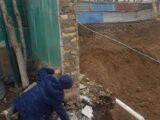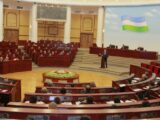UN Special Rapporteur on Combating Money Laundering in Uzbekistan
15.12.2021The Special Rapporteur on the promotion and protection of human rights and fundamental freedoms while countering terrorism, Fionnuala Ní Aoláin, conducted an official visit to Uzbekistan from 29 November to 7 December 2021 to assess its counter-terrorism laws, policies and practices, measured against its international human rights obligations.
The Special Rapporteur met with different officials of the Uzbek governmental bodies and Parliament.
During her visit, apart from visiting Tashkent, the capital, the Special Rapporteur travelled to Nukus city in Karakalpakstan, as well as to Namangan and Qashqadaryo regions. She visited several prisons and a rehabilitation centre for individuals repatriated from the Syrian and Iraqi conflict zones.
Uzbekistan is a party to major international human rights instruments including the Convention against Torture and Other Cruel Inhuman or Degrading Treatment or Punishment (CAT), the International Covenant on Civil and Political Rights (ICCPR), the Convention on the Elimination of All Forms of Discrimination against Women (CEDAW), the International Convention on the Elimination of All Forms of Racial Discrimination (CERD), the International Covenant on Economic and Social and Cultural Rights (ICESCR), and the Convention on the Rights of the Child (CRC) and its two optional protocols, Convention on Persons with Disabilities (CPD) as well as other international and regional agreements.
The risk of terrorism in Uzbekistan is generally assessed as low. The Global Terrorism Index (2020)1 ranks Uzbekistan 134th placing the country in the category of countries with insignificant levels of global terrorism threat and experiencing high levels of security and stability. Recent regional developments, specifically the change of governing administration in Afghanistan have elevated regional security concerns. The Special Rapporteur observes the pragmatic approach of security officials in addressing the regional security context and dealing with the de facto authorities in Afghanistan.
You may find the whole text of the Preliminary findings of the Special Rapporteur here: UZB Preliminary findings – Eng – FINAL
We will focus only on one chapter of this report: money laundering. Because the Uzbek authorities assign the big areas in the cities centers to unknown small companies. We don’t know what are financial sources of those companies for construction and where they will stock the revenues after construction.
Countering Terrorism Financing and Human Rights
- The Special Rapporteur recognises the legitimate risk of terrorism financing. Her mandate has consistently underscored the need for effective, human rights and rule of law compliant responses to terrorism financing and has called on governments to ensure that countering the financing of terrorism (CFT) measures should not become a legitimizing basis for human rights abuses. She pays particular attention to the manner in which CFT regulation negatively impacts civil society and may hinder the functioning and development of civic space.
- Uzbekistan’s existing AML/CFT framework follows from the criminalization of economic crime and terrorism financing in the Criminal Code (2001) and the adoption of Law No. 660-II “On Combating Money Laundering and Terrorist Financing” in 2004 (entered into force 2006 and periodically updated). In September 2018, the President established the Interdepartmental Commission on Counteracting the Legalization of Proceeds from Crime, Financing of Terrorism and Financing the Spread of Weapons of Mass Destruction, which appears to strengthen inter- agency AML/CFT responses. Relevant regulatory frameworks include Resolution 854 (2018) on “Regulations on the Procedure for the Interaction of Justice Bodies with Other Government Bodies, Local Governmental Bodies, and Law Enforcement Agencies to Identify Non-Governmental Non- Commercial Organizations that Violate the Law,” establishing a system of inter-agency communications to monitor NGO-specific violations, including the receipt of funds from the illegal sources. This is augmented by Resolution 402 (2021) on “Additional Measures to Implement the Law ‘On Combating Legalization of Proceeds from Criminal Activity, Financing of Terrorism and Financing the Proliferation of Weapons of Mass Destruction.’” The Special Rapporteur did not observe evidence of the concrete mainstreaming of human rights into the national AML/CFT strategy and framework, and officials seemed unfamiliar with the relevant international standards in this context.
- Additionally, Article 7 of the 2018 Law on Combatting Extremism addresses financing of terrorism. In this context, the Special Rapporteur observes with concern that ‘financing terrorism’ is broadly defined and that asset seizure or suspension of financial transactions of legal entities could lead to a violation of significant rights, including privacy18 and due process and procedural rights.
- Positively, on March 3, 2021, the President issued an Order on Additional Measures for State Support of Non-Governmental Non-Commercial Organizations (NNOs) Ensuring the Freedom of Their Activities, Protection of Rights and Legitimate Interests, which requires, inter alia, an increase in the total amount of foreign funding NGOs may receive on an annual basis; and collaboration between the Ministry of Justice, Supreme Court, and Prosecutor General’s Office on drafting a law that envisions administrative liability for interference of state bodies and other officials into the legitimate work of NNOs. Further, on March 4, 2021, the President issued a decree approving the Concept on Development of Civil Society in 2021-2025 and the Road Map on Implementation of the Concept, envisioning improvements to the legal framework for civil society, partnerships between CSOs and government, and inter alia state support for CSOs’ activities. These efforts are welcome. However, their impact on positively augmenting and enabling independent civil society—particularly in the countering terrorism and terrorism financing context, which is generally more vulnerable to governmental overreach and covert actions—are still to be demonstrated, and ongoing implementation of these commitments is recommended.
- Uzbekistan has been a member of the Eurasian Group on Combating Money Laundering (EAG) since 2005.19 Mutual evaluation is in process and expected to take place in May 2022. Uzbekistan performed a national CFT risk assessment in 2019 with expert cooperation from specialized international organizations. The Special Rapporteur was informed that the risk assessment of non- governmental organizations and religious organizations found them to be of “higher risk” than other sectors of terrorist financing and that terrorist financing threat from the NGO sector was a government priority. Comparative global assessment has generally found the NGO sector to fall outside the high-risk category,20 and the Special Rapporteur is troubled at this finding in this national context given the low terrorism and (violent)extremism threat assessment. She underlines the importance of risk assessments being undertaken in a high-quality evidence-based manner, including through direct consultation with a diverse range of NGOs, including independent civil society including community-based organizations, which are likely to have more salient information on and a more nuanced understanding of the actual risks of the complex and diverse sector. She is concerned that the seemingly blanket assessment of all NGOs and religious organizations as “higher risk” is inconsistent with FATF recommendation 8.21 More broadly this approach to NPO/NGO’s highlights broader concerns about the constriction of civic space, undue burdens on the regulation of NPOs/NGO’s and the negative impact of counter-terrorism measures on civil society. As clarified in the interpretative note to FATF Recommendation 8, countries must first identify which subset of NGOs falls within the FATF NPO definition, and only then undertake CFT measures that are “risk-based,” “targeted,” “proportionate” and “effective” in light of the empirically founded, differentiated sub-sectoral risks.22 She notes in this regard that FATF recently concluded that “most countries are not yet conducting adequate risk assessments of their NPO sector and fewer are conducting risk-based outreach and monitoring.”23
- The Special Rapporteur believes that the national AML/CFT strategy must be adjusted to ensure a tailored approach consistent with the empirical realities of the sector and Uzbekistan’s international human rights and law obligations, particularly vis-à-vis civic space and religious minorities. She emphasizes that the Terrorist Financing Convention, Security Council Resolution 2462, and the FATF interpretative note to Recommendation 8 all reaffirm that any CFT measures must be implemented consistent with international law, including human rights law and humanitarian law. She is concerned that there appear to be few safeguards in place to protect the legitimate exercise of NPOs and to protect against unfounded repression of free expression or discrimination against groups or individuals, including religious minorities, in the CFT arena—all rights protected by Articles 2, 18, 19, 21, 22 of the ICCPR, among other instruments. She emphasizes the need for the recent positive executive measures, which are intended to protect the rights and fundamental freedoms of NPOs, to be squarely aligned with the national AML/CFT strategy and any CFT measures affecting NPOs therein.
- As regards the broader CFT national risk assessment, the Special Rapporteur notes that the national risk assessment endorses controlled access to departmental databases for government agencies and the private sector. She wishes to highlight the significant risks of the violation of the right to privacy as protected by Article 17, ICCPR. In line with other recommendations concerning data privacy, the Special Rapporteur recommends an augmentation and implantation of data protection to apply to public CFT measures and any exchanges of information with private entities.
- The Special Rapporteur acknowledges that significant capacity building efforts have been expended on CFT including in knowledge transfer on analysis, basic and enhanced investigation, financial disruption, and UN Security Council resolutions sanctions. It is unclear how substantially human rights obligations and practice were fully mainstreamed in these efforts. She recommends substantial augmentation in technical assistance to the Interdepartmental Commission on Counteracting the Legalization of Proceeds from Crime, Financing of Terrorism and Financing the Spread of Weapons of Mass Destruction concerning human rights obligations and the NPO sector in CFT, including through collaboration with the EAG, the Justice Ministry, multilateral entities and local civil society actors and the Office of the High Commission on Human Rights. She also offers the ongoing assistance of her office in this regard. The Special Rapporteur also emphasizes the critical need to develop concrete human rights benchmarking in the national AML/CFT strategy, with explicit reference to the international human rights law and other international law obligations that apply.
Reprisals and Cooperation
- During her visit the Special Rapporteur was made aware of restrictions and challenges faced by independent civil society, including organizations and individuals working on human rights violations including religious belief and exercise, some aspects of which have been addressed in the preliminary findings presented here. She stresses that a healthy, open, critical, and engaged civil society is indispensable to preventing and countering the conditions conducive to violence, violent extremism, and terrorism.29 She also observes civil society engagement on issues related to repatriation, gender issues (including trafficking in persons), and social and religious work by religious organizations.
- As is her general practice, she stresses that reprisals or negative consequences for lawyers, civil society members, or persons in detention for meeting, speaking, and/or providing relevant information to the Special Rapporteur will not be accepted and constitute acts of intimidation and reprisal for cooperation with the United Nations. The Special Rapporteur consistently follows up with all her interlocutors to ensure no such practices or consequences have followed her visit.
__________________________________________________
18 OSCE, Comment on the Law of Countering “Extremism” of the Republic of Uzbekistan (Dec 4. 2019).
19 And Associate Member FATF
20 FATF 2015 R8 best practices paper affirms, based on a 14-country 2014 survey that “the abuse of the NPO sector by terrorist entities is, in the context of the global NPO sector, a low-probability risk” (para. 16).
21 She notes that 2010 Mutual Evaluation Report (MER) found Uzbekistan only partially compliant with Recommendation 8.
22 FATF interpretative note, pp. 59-60.
23 https://www.fatf-gafi.org/media/fatf/documents/Unintended-Consequences.pdf
29 A/HRC/40/52 Report of the Special Rapporteur on promotion and protection of human rights and fundamental freedoms while countering terrorism on Impact of measures to address terrorism and violent extremism on civic space and the rights of civil society actors and human rights defenders (2019)

